Paul Von Mertens - Interview
by Lisa Torem
published: 6 / 11 / 2013
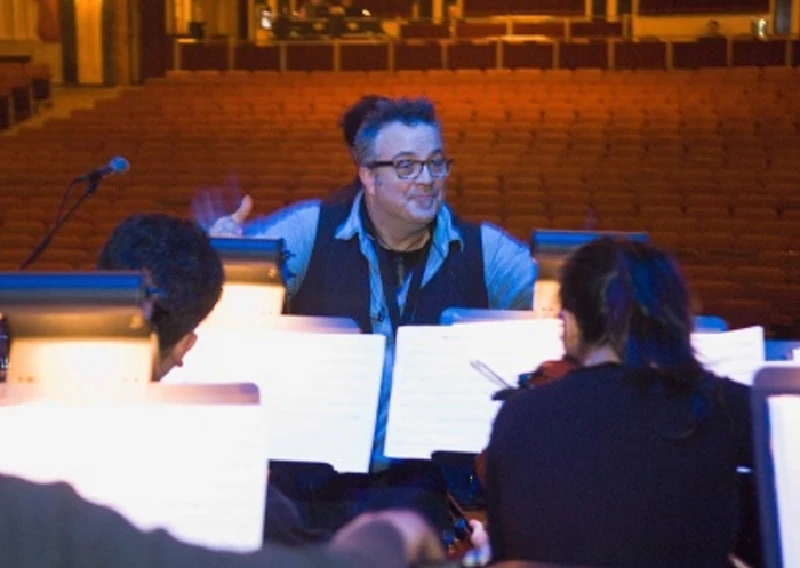
intro
Lisa Torem speaks to Brian Wilson Band musical director Paul Von Mertens about working with Wilson, and the Brian Wilson Band's current tour with Jeff Beck
Being a long time Brian Wilson Band vocalist and instrumentalist, Scott Bennett appreciates composer/arranger/multi-instrumentalist Paul Von Mertens' uncompromising work ethic and easy going nature. So when asked his impressions, Scott’s response came quickly. “I was working with Paul before Brian’s band came together. He’s always spot on in the studio, he’s even better as a performer and he’s a lovely guy. He handles the giant task of being our musical director with grace and a great, dry sense of humour. It is always an honour to work with him.” Vocalist and multi-talented instrumentalist Probyn Gregory offered his own perspective: “To say that ‘Moitens’ is always a solid, engaged player is just the tip of the iceberg. He earned his rise through the ranks to become the Brian Wilson Band Musical Director, and his arrangements on our albums have been stellar, harming no lab animals in the process.” Paul resides in Oak Park, Illinois and operates a puppet theatre with his wife, Cynthia. In addition, he is an accomplished sound designer for contemporary theatre. Besides singing, he plays bass harmonica, flute, clarinet and saxophone, has joined forces with Elton John, Paul McCartney and popular Chicago group, Poi Dog Pondering, and, since the late 1990s, has been an orchestral arranger and musical director for Brian Wilson - He first played clarinet flute and saxophone on the 1998 album, ‘Imagination’. On the last night of the Brian Wilson/Jeff Beck tour, at the intimate, historic Riverside Theatre in Milwaukee, Wisconsin, Von Mertens, with split-second timing, kept a vigilant eye on both sides of the stage. One moment he cued and stood watch over the expanding choir (which ultimately included vocalist/violinist Lizzie Ball from the Jeff Beck Band), and the next he played dreamy sax solos. What transpired was a spectacular wall of sound, which by the grand finale involved more than sixteen distinctive players. So how do you bring out the best in a diverse line-up, which includes Beck’s popping, slamming bassist, Rhonda Smith and original Beach Boy Al Jardine, whose sharp vocals define a generation? Or juxtapose the British guitarist’s plaintive, transcendental ‘Danny Boy’ with the multi-layered ‘Surf’s Up’ and the Gregorian bones of ‘Our Prayer?’ Exactly one week after Milwaukee, I chatted with Von Mertens over a triple shot latte after fielding blinding buckets of rain. He explained the intricacies and highlights of working with Wilson in the studio and onstage. PB: Who inspired you musically? PVM: When I started seriously playing saxophone, Sonny Rollins was the person I really wanted to sound like, and the player that I strove to emulate a lot. But I also listened to Coltrane and Stanley Turrentine, some of the more soulful players. Before I started playing jazz, I listened to a lot of rock and roll like Jethro Tull and the Grateful Dead. The Dead were interesting to me because they opened up my mind to just the idea of improvisation and playing spontaneously in a group, because that’s something that they did - some might say ad nauseum - but at that time of my life it was interesting; thinking about being able to stretch out on long musical forms and improvise in a very free way. I was less interested in pop music at that time and more interested in jazz and improvisation. PB: So when you heard saxophone, you found yourself. PVM: I started on clarinet. I was not a very good student. My clarinet teacher brought his saxophone to one of my lessons when I was in high school. I had just been plugging away at clarinet, and then he brought a saxophone to my lesson and said, “Why don’t you just take this home and fool around with it?” After that, the clarinet just went bye and bye for a long time. The saxophone was inspiring and fun and cool to play and fit into the kind of music I liked a lot. I liked Bruce Springsteen a lot because of Clarence Clemons. PB: You were conductor on Mono’s fifth album, you’ve composed original music with Poi Dog Pondering and you’ve written arrangements for top acts. Which skills have brought you the most fulfillment? PVM: I think now the thing I enjoy the most is orchestration, writing and arranging and then recording it; hearing it performed and committing it to a recording. The work I did with Brian on the Gershwin record was enormously challenging and satisfying for me, and it was just tremendous to be able to write orchestrations under Brian’s direction, and then to record them and then to hear the finished product. It’s a completely different thing than performing. But in some ways it’s kind of a deeper experience. It’s not momentary. You feel like you’re really building something big. PB: You made a lot of decisions before you went into the studio. PVM: I helped Brian with the song selection. He had very specific songs that he knew he wanted to do. I gathered up a lot of other songs that I thought he might be interested in. We listened to all of them, and he basically said, “Yes, no, I like that one. I don’t like that one.” There was also a huge number of fragments of unfinished Gershwin songs, some were just snippets, and that entire set of what they call ‘trunk music’, as in “found in a trunk” (Laughs), long after the fact had all been realized in the form of very basic piano demos, literally just a piano player playing through the sheet music that was left behind. I listened to all of those with Brian and he did the same thing; rejected many of them, and the ones he thought he could do something with he kept and he worked up into the two original songs. PB: ‘I’ve Got a Crush on You’ became a 50’s-style romp. Whose decision? PVM: I try not to lead Brian too much in one direction or another because he’s really at his best when he can be spontaneous and just respond in the moment to what he’s hearing. So with all of the Gershwin songs, I made suggestions, which, again, he’d either say. “That sounds like a good idea” or “I’m not hearing it that way.” PB: When he heard “Rhapsody in Blue’ as a toddler, it stuck. PVM: That’s like a very deep memory for him. These days he seems to really enjoy music that sounds like doo wop, stroll and kind of old school. We did ‘Monster Mash’ at his request. It was the night before Halloween, but that song had come up a couple of years before on a tour. He asked me if I knew it and he started to recite the first verse. I said, “I know it,” and he said, “I want the band to play it, and I want you to do the verse and I’ll sing the chorus” and I said, ‘Okay.’ (Laughs). He’s not demanding, he’s not difficult. It seemed like a small request. But when he has a strong feeling about something, you have to say yes and go with it. So we learned it in a sound check. That night, the show was in Rhode Island and just before we went out on stage - literally the lights went down - Brian said, “I want to start the show with ‘Monster Mash’.” We said, “Okay, sure.” We started the show with ‘Monster Mash’. People looked a little puzzled, but he loved doing it. He loved doing it so much that after the intermission he said, “I want to start the second half with ‘Monster Mash'.” We said, “Okay, but we probably shouldn’t do this all the time - it’s a great song but people might not get it.” So we did it that night twice along with ‘God Only Knows’ and ‘Surf’s Up’ – the deepest songs ever written (Laughs), but that’s Brian. We continued to do ‘Monster Mash’ all the way through November on tour until we talked to Brian and said, “Halloween is over, so maybe we should do ‘Little St. Nick’ or something for Christmas, and he said, ‘Okay’.” PB: The vocal rendition of the main theme to ‘Rhapsody in Blue’ was unique since most of us know it as a piano piece. Would you consider doing additional vocal renditions drawn from the remaining themes or was that a one off? PVM: I don’t know. I think we're done with Gershwin. I feel like he really nailed the things that he wanted to do, and we did find some other interesting songs that he liked throughout the record; in particular, finishing those song fragments was really interesting. The melody for ‘I Like and I Love You’ he improvised in one take. PB: Brian has a great ear. PVM: That was it. We had done an arrangement with the chords and the band played it instrumentally, and then with a microphone in front of him Brian improvised a melody. I transcribed it, saved it, of course, immediately. Scott Bennett wrote lyrics for it and then we did the final take. But, really, the melody that we ended up using was something that just came spontaneously, like a flash. PB: When you worked on the ‘Smile’ project in 2004, you were asked to provide transitional phrases. PVM: Darian Sahanj was most involved with that. I did some of the orchestration and I played on it. Darian worked really closely with Brian and Van Dyke Parks on putting all of those pieces together. I want to be sure that Darian gets the credit he deserves for that because he already had so much knowledge about all of the outtakes and what was available. He would play things for Brian and Van Dyke and say, “Here we have just the bass line with percussion. Was there supposed to be something else here - either lyrics or melody or other parts?” And they would say, “Oh, yeah, actually.” They had literally found notebooks with lyrics in them to flesh out some of those incomplete takes. I talked to Brian about how he wanted to use strings and horns. Some of it was just about transcribing what was on the original sessions and adapting it to the instrumentation that we had. For ‘Surf’s Up,’ I had an idea for a string part and Brian said, “Go ahead. Do it.” As far as the string parts and orchestration goes, Brian usually gives me pretty general instructions about what he’d like, using adjectives like, “It should be sentimental” or that kind of thing. Sometimes he has very specific musical ideas. I just have a tape recorder on in case he sings or plays something on the piano. It goes from the general to the very specific, so sometimes he’ll say, “There’s no seventh in that chord,” and he’ll want one note taken out. He’ll want the shape of the melody line to be changed or something like that, but he also tends to leave things alone if he’s happy with what he’s hearing. You can hear that in the early days of the sessions. He had great musicians working with him when he started working with the Wrecking Crew. I think he relied on them to play intuitively, and then he directed the band. In some cases, I can hear that going on, and there are other times when the entire thing is planned out in his mind. I’ve also experienced where he’ll say, “I want Nicky to play this and sing this. I want Taylor to sing this part and Jeff to sing this part.” So, yes, sometimes it’s very clear and specific, and other times he’s in the moment and he takes what he likes and what he hears, and he’ll say, “Don’t do this, do that. Play that up an octave.” We’ll say, “Really, up an octave?” He’ll say, “Just do it!” Sure enough, it sounds great. PB: Brian heard Jeff Beck play ‘Surf’s Up’ back in 2005 at the MusiCares event. Why did it take until now for the two bands to tour? PVM: I think it was just a confluence of events. I know that Brian had been interested in doing a rock album, and I don’t know the details of how this particular collaboration at this time came together, so I can’t give you a specific answer. PB: When you first heard about the concept, did you feel an instrumentalist and vocal-based group might be an unusual pairing? That said, the fans were on the edge of their seats wondering how the finale would play out. There was a strong element of suspense. PVM: I’ve worked with many wonderful musicians, but having met Jeff at MusiCares he was one of the ones that really impressed me as being a player’s player. He was really lovely to work with, and an amazing musician with a zero diva index. He was all about the music and, in fact, a different song had been chosen for Jeff to do, ‘You Still Believe in Me’. We rehearsed it and said, “Okay, it seems good,” but then he started to play the melody to ‘Surf’s Up’ just from memory ,and Darian started playing it on piano and they just felt their way through the whole song while we stood there and said, “Wow, that’s what you should do.” The other thing was fine, but this is what you’ve got to do for the show. So that was just a totally spontaneous thing. Jeff knows the song and he loves it, and he’s the kind of player that can play anything that he hears in his head, so we ran though it at the rehearsal that day and he said, “I’m going to really, really practice it for the show tomorrow,” and he did. I think he just went to his hotel room and worked on it all night long because he came back the next day and did a beautiful job at MusiCares. So when I heard that they were talking to Jeff about doing a tour with us, my reaction was that that was fantastic. I didn’t even think about how this was going to work until later, but my first reaction was that he’s an amazing guy and, clearly, has a deep love for Brian’s music. Then actually putting it together was a bit of a give and take to figure out how can we translate their mutual admiration and interests into a show. So what you saw in Milwaukee is what we ended up with. PB: Before going in the studio, some artists test out new material on a live audience. Has that worked out for the Brian Wilson Band? PVM: Specifically, for ‘Smile’ we rehearsed the music and then performed it at least thirty times before recording it. Nothing was changed, but it was great to know the music so well when we finally did the recording. We were able to record all the basic tracks live in the studio, something that is rarely done these days. PB: How does the audience affect your performance? PVM: If I relied on the audience, I think I would be in trouble. It’s a vital ingredient, obviously, to a live performance, but it’s also not something that can be gauged. It’s more a belief in yourself and in the music you’re doing. I’ll give you an example. During the Beach Boys 50th Reunion Tour last summer, we played in Barcelona. People were losing their minds, dancing wildly and singing along with every song, literally throwing themselves at the stage. They kept singing ‘Barbara Ann’ after the show was over. When we left the stage, they were still singing ‘I Get Around’. We played Oslo at the very next show. They liked it, but they didn’t like it like that. They sat attentively, they were polite and listened to every song, applauded at the end of it and then they went home. PB: So that’s a cultural thing. PVM: It’s totally a cultural thing and that’s the point. If I needed the audience to inspire me for the show, it could be a problem if I’m in a different culture getting completely different reactions. The first time we played in Japan, I thought, “Oh, my God, they hated it.” They just sat there, and I was a little bit bummed out until they applauded for like five minutes at the end of the concert when it was the appropriate time to applaud. Actually, something Brian says a lot is “Let’s play for each other.” PB: A lot of music directors are at the keyboards. You play sax and harmonica and move across the stage to cue harmonies. How do you oversee the production while keeping the pacing on target? PVM: Here’s the secret. It’s a great band. They all know what to do (Laughs). Particularly, Darian, Nick, Jeff Foskett, those guys know more about the vocal parts than I do. They’ve spent their lives listening to those songs and learning them. I know when it’s right and when it’s wrong, but there’s no point in me trying to dictate to them what they should be doing. I really rely on them to know those parts, and I feel like my role is to direct traffic and to run the rehearsal, run the sound check and make sure everybody knows what’s on the set list. The band has dubbed me “the semi conductor” because sometimes I conduct and sometimes I’m not, and there’s this moment when you need to raise the flag and go, “Okay, we’re stopping here” or “Let’s start together.” Everybody knows what they need to do, but it’s convenient to have one person say, “Let’s start now.” Otherwise we’d be working cross-purposes so it’s really directing, not creating. I just have to know the music well and be able to steer. PB: How does each artist get a chance to shine? PVM: That is part of what I do. You have to take everybody’s musical personalities and strengths into account and make sure that those things get highlighted. For example, Al Jardine sounds so fantastic, particularly when he’s doing the lead vocals. It’s just timeless, so making sure his voice is featured in the set in a way, which really shows him at his best. Those kinds of things are important. PB: Who ultimately creates the set list? PVM: It’s kind of done by consensus. I can’t tell Al what he is or is not going to do. I don’t feel right doing that, but I can take his temperature and say, “Do you feel good about this particular song?” or “How about if we do ‘Cotton Fields’ tonight instead of something else?” I’ll make suggestions. I think he appreciates a certain amount of direction because I don’t have a real bossy personality. I tend to work by consensus and consult with people rather than giving orders. People have told me that they appreciate that I tend to be more of a facilitator; inspiring rather than dictating. When I make a set list, for example, I take suggestions. I take input from everybody, and I always ask Brian what songs he wants to do and make sure that he’s comfortable with what we do. Sometimes there’s a song that he sounds great on that we’ve neglected for a while, and I’ll suggest putting it back in the set, those kinds of things. PB: I don’t believe anybody came away dissatisfied with the list. It was a mix of hits, spirituality and songs that never received proper recognition PVM: That’s good. The set list is the story that we are trying to tell. It’s very subtle, and I don’t think it’s anything that I’ll ever feel I’ve got completely mastered because I need that input and consensus from other people to avoid blind spots that I might have about songs that are neglected, songs that are not necessarily working in a particular order. Someone will say, if we do ‘Sail on Sailor’ down here, it will follow a more natural flow. I just don’t have all of those answers. But the show you saw in Milwaukee was really a result of playing live for weeks and honing the set list down, getting rid of the things that weren’t working. There were certain songs we thought we really had to do, and then after a couple of nights we thought weren’t working. It’s the script that we’re all working from. PB: How did that involve Jeff? PVM: There was an exchange of opinions about what songs to do and who should play them that was largely trial and error. We tried some things that would be great ideas that didn’t really work. Jeff is really easy to talk to; he loves music and has a really good sense of who he is as a musician. That’s why his playing is so great. That’s why his set is so strong. He really knows what he’s about. It’s not a diva thing; it’s an artist thing. He felt really strongly about playing ‘Danny Boy’ and ‘Surf’s Up’, and he would work on some other things for a while and ultimately say, “It’s not working for me.” It was collaboration. Everything gets boiled down, and you see what’s in the pot. He did a literal transcription of Les Paul’s ‘How High the Moon’. Lizzie sang the lead vocal with Probyn Gregory and Jeff Foskett. They had learned this really complex vocal part. Jeff played Les Paul’s solo, note for note, and then at a certain point he felt it wasn’t working. He just decided not to do it. PB: But it’s never wasted. There’s so much emotional growth that comes from creating something like that. You’ve played with many high profile acts and your skills are in demand, but you’ve remained so long with Brian. PVM: It’s still a challenge. It’s still the most interesting and exciting thing – if I had made up my life in 1999, I couldn’t have imagined the things that I’ve done with Brian. I love him and I love the music and I love the people in the band. That’s why I’m there. I don’t know where else in life you can find that satisfaction. It’s such a good fit. I do have a unique set of skills and I think that I’m able to do so many things with Brian, from writing and arranging to working with the band and Brian, playing lots of different instruments, getting a chance to sing and learning how to play bass harmonica. These are all exciting and interesting challenges. I can’t imagine doing something else, and I can’t imagine not doing it either. It’s like my musical family. PB: What should ‘Love and Mercy’ document? PVM: I don’t know if the film covers the years, about 1999, when Brian restarted his solo career, but I hope it shows the satisfaction of revisiting something that was deemed a failure, that is ‘Smile’, to redeem it, go into your past and dig something up that everyone thought was junk and have it hailed as a masterpiece. That’s one of the most remarkable experiences that I’ve had with Brian. For him to receive the love and appreciation from the fans by performing live is a remarkable thing, too. PB: Some fans have memorized his life. PVM: It’s very emotional. We played last year in Bonnaroo, a very youth-oriented event. Everybody there is young enough to camp out in the rain and enjoy it. Three kids had managed to get a spot right at the edge of the stage, right on the rail where Brian was. I couldn’t hear what they were saying but I could read their lips, “Oh, my God, it’s him.” To be part of something that makes people so happy is remarkable. PB: How do you contrast the 50th Anniversary Concert with this tour? PVM: For this tour, the intention was to work and collaborate with Jeff. We’ve done mostly tours with Brian doing his music, and when we’re doing that that’s our world. It’s just up to Brian and his management to decide what we’re doing, and the Beach Boys was not our world. We had to share the turf with others. It was very successful and very difficult, a large entourage and a lot of personalities. Just imagine a fifty-year reunion of any group of people. There was so much history that it was intense at times. I’m really grateful that Brian insisted on bringing his band; that was the condition for doing the tour. Artistically and emotionally, it was a very smart thing to do. On tour with Jeff, we had our space and Jeff had his. We had some moments to come together, collaborate and share stuff. I’d never done anything like it. I loved hearing Jeff play every night. The records don’t do him justice. It’s not even about the guitar or being a guitar player. It’s a level of expression that is rare. I haven’t heard too many people play in a way that transcends their instrument and the time and the place. His pure self-expression is something I just stand in awe of. We would just look at each other and go, “How did he do that?” I really don’t like that expression “guitar hero”. It brings to mind loud, fast expression - Jeff can go from a whisper to a scream. What’s remarkable is that he doesn’t make it sound easy. It feels like he’s wringing the emotion out of the instrument and that’s so much more exciting than someone who goes, “I can do this all day.” Lisa Torem wishes to thank Probyn Gregory and Scott Bennett from the Brian Wilson Band, Andy Cassidy of Pennyblackmusic and Paul Von Mertens for meeting up during a Midwest monsoon. The top two photographs were taken by Jeff McEvoy, while the remaining photographs were taken by Jim Summaria at www.jimsummariaphoto.com,
Picture Gallery:-
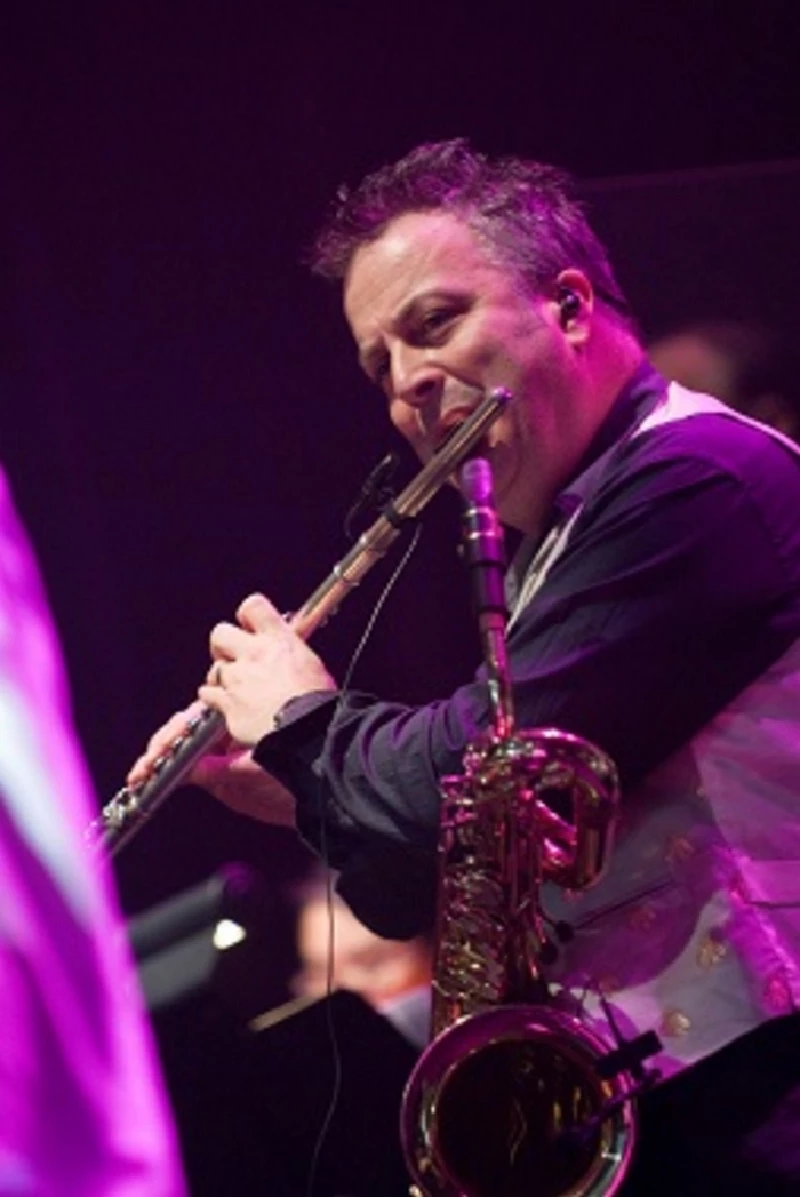
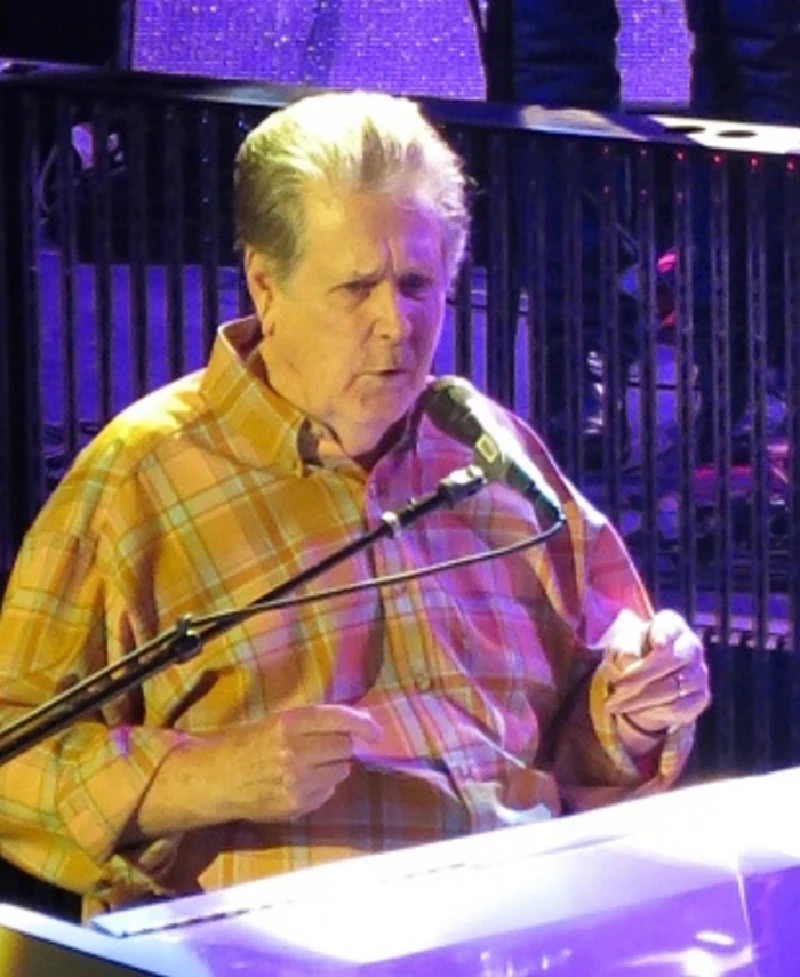
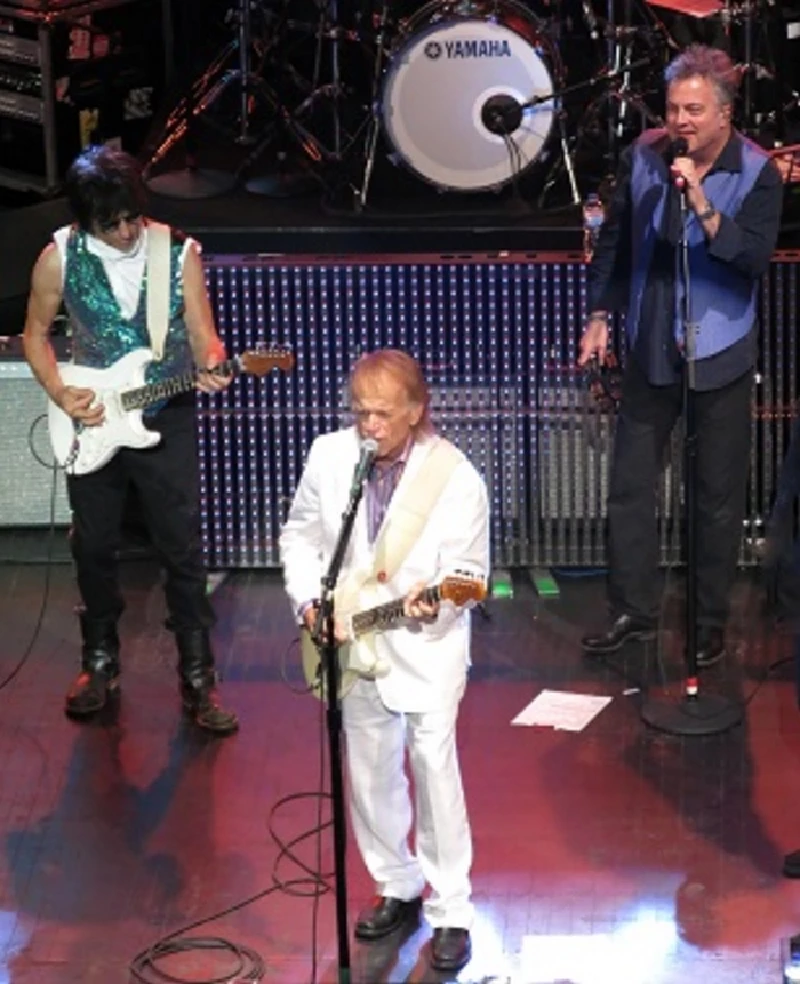
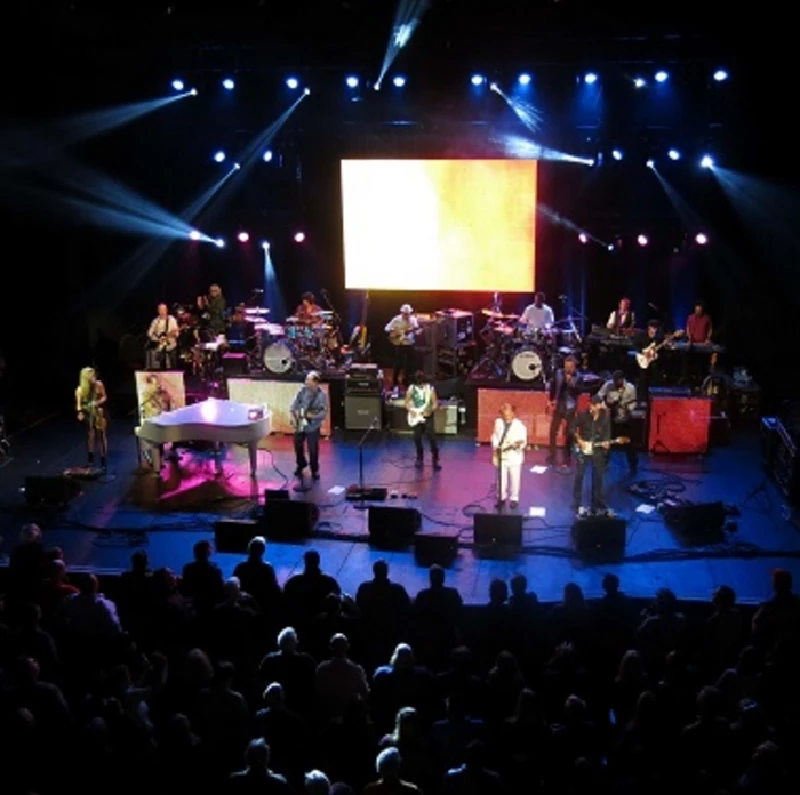
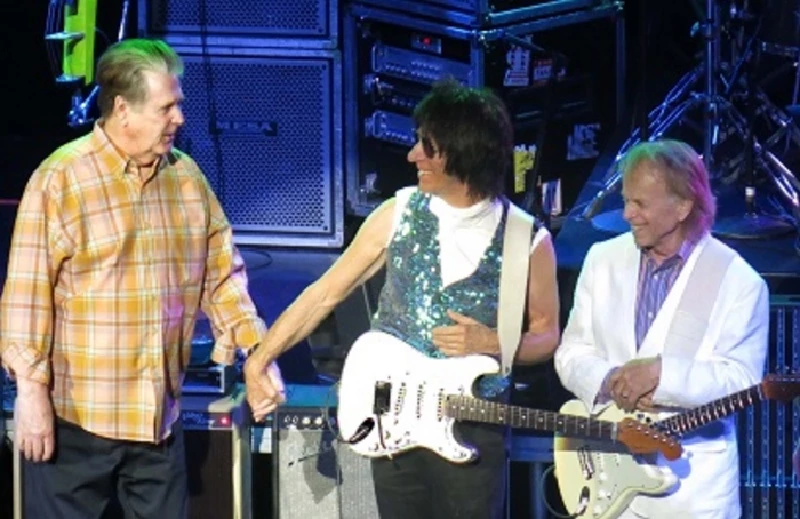
Visitor Comments:- |
| 741 Posted By: lisa torem, chicago on 23 Feb 2015 |
|
Hi
Thanks for getting in touch. We're happy to hear from you.
Cheers,
Lisa
|
| 738 Posted By: m salnick, west palm beach fla on 20 Feb 2015 |
|
Brian Wilson Jeff Beck Jeffrey Fosket paul vonMertons! That's about the best of the best it doesn't get any better than that. I've seen them they're wonderful when you add Al Jardine David Marks it's phenomenal
|
| 675 Posted By: Lisa, Chicago on 10 Jan 2014 |
|
Hi Gus,
Thanks for adding your comments. The Brian Wilson Band is genuinely a top notch ensemble due to the skills sets and creativity of all.
Lisa
|
| 674 Posted By: Gus, Providence, RI on 02 Jan 2014 |
|
After following the Brian Wilson Band annually since 2000, and after seeing just about every major rock and pop act over the past 40 years or so, Paul and the rest of the Brian Wilson Band are just about as good as it gets. The 50th Celebration/tour only worked as well as it did because of Brian's band, and the Wilson/Beck Tour just continued the band's legacy of playing equal to one of the best guitarist's of all time. Brian has been blessed by having a unique set of top rated musicians and vocalists that are not only multi talented instramentalists by who really care about his timeless music. Their live performances have proved that time and time again over the past 13 years or so. They really are second to none.
|
most viewed articles
current edition
Peter Doherty - Blackheath Halls, Blackheath and Palace Halls, Watford, 18/3/2025 and 21/3/2025Armory Show - Interview with Richard Jobson
Liz Mitchell - Interview
Lauren Mayberry - Photoscapes
Deb Googe and Cara Tivey - Interview
Max Bianco and the BlueHearts - Troubadour, London, 29/3/2025
Maarten Schiethart - Vinyl Stories
Sukie Smith - Interview
Clive Langer - Interview
Kim Wilde - Photoscapes
previous editions
Heavenly - P.U.N.K. Girl EPBoomtown Rats - Ten Songs That Made Me Love....
Trudie Myerscough-Harris - Interview
Doris Brendel - Interview
Beautiful South - Ten Songs That Made Me Love...
Kay Russell - Interview with Kay Russell
Dwina Gibb - Interview
Pulp - Ten Songs That Made Me Love...
Sound - Interview with Bi Marshall Part 1
Jay Reatard - Interview
most viewed reviews
current edition
Davey Woodward - Mumbo in the JumboNigel Stonier - Wolf Notes
Wings - Venus and Mars
Only Child - Holy Ghosts
Kate Daisy Grant and Nick Pynn - Songs For The Trees
Neil Campbell - The Turnaround
Philip Jeays - Victoria
Darkness - Dreams On Toast
Suzanne Vega - Flying With Angels
Charles Ellsworth - Cosmic Cannon Fodder
Pennyblackmusic Regular Contributors
Adrian Janes
Amanda J. Window
Andrew Twambley
Anthony Dhanendran
Benjamin Howarth
Cila Warncke
Daniel Cressey
Darren Aston
Dastardly
Dave Goodwin
Denzil Watson
Dominic B. Simpson
Eoghan Lyng
Fiona Hutchings
Harry Sherriff
Helen Tipping
Jamie Rowland
John Clarkson
Julie Cruickshank
Kimberly Bright
Lisa Torem
Maarten Schiethart